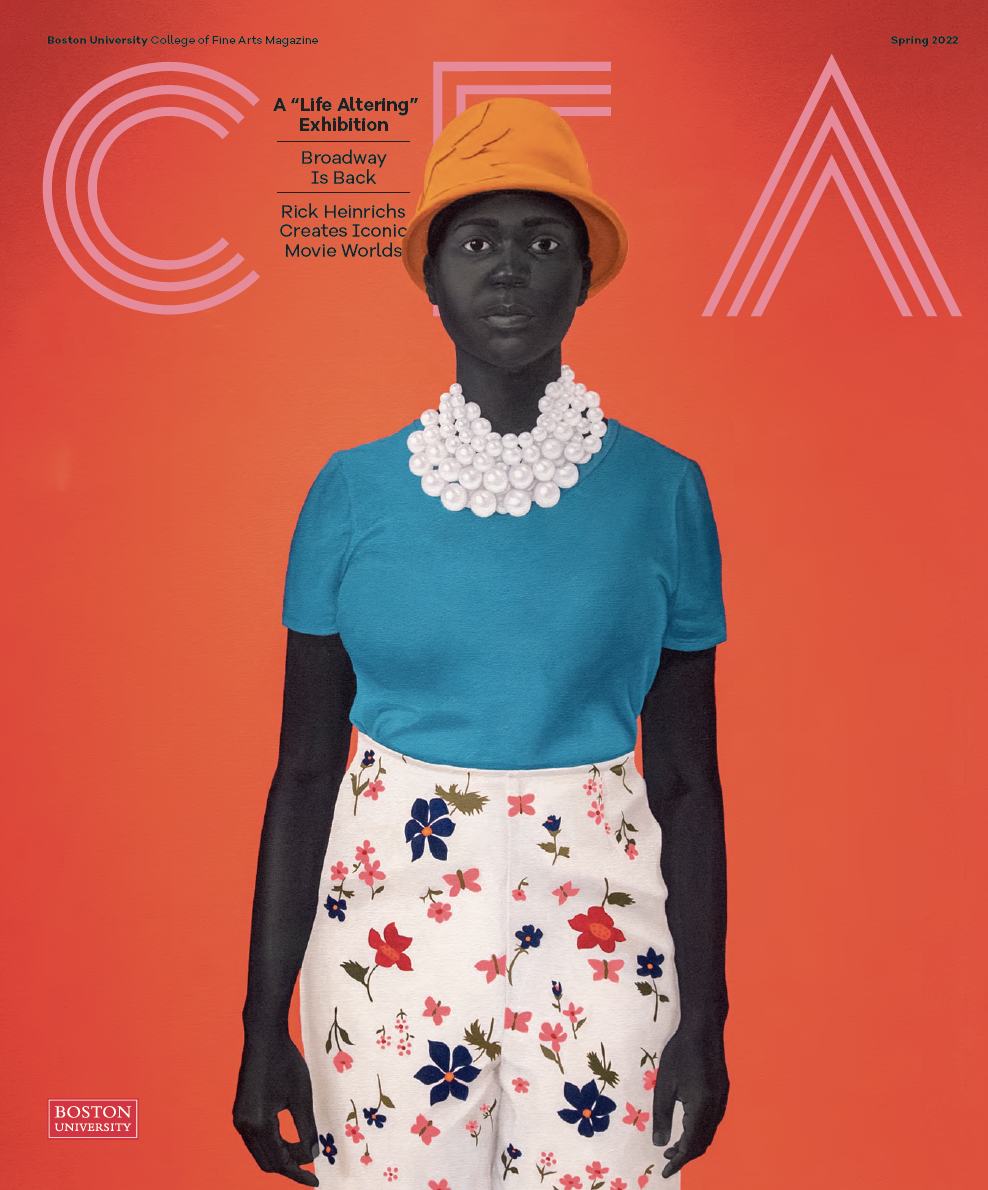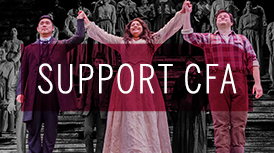Stay Well, Play Well
BUTI’s Health & Wellness Program helps student musicians avoid injury, cope with anxiety
By Joel Brown | Photos by Jackie Ricciardi
Like elite athletes, classical musicians often feel driven to practice for hours at a time so they can perform at a high level when the spotlight turns their way. And like athletes, they sometimes pay a price for their devotion.
Violinists often suffer peripheral nerve problems and neck strain. Brass players endure restricted diaphragms and facial pain. Pianists may develop forearm tendinitis. Like athletes, many musicians try to “play through” the pain—usually a bad idea. Many also suffer from bouts of anxiety when it’s time to audition or perform.
The talented high school–age musicians attending the BU Tanglewood Institute face the same occupational hazards, but BUTI has launched a program designed to ensure they’ll leave the campus in the Berkshires better equipped to avoid many of those health issues and manage the rest.
“Making music at this level of artistry requires intensive physical and mental resources,” says Hilary Field Respass, executive director of BUTI. “Our Health & Wellness Program is designed to expose students to tools they can use to maintain healthy practice and mind-sets as they strive for peak performance.”
For the past four years, BUTI has offered a series of health and wellness events for students, including yoga and mental skills training, as well as classes teaching the Alexander Technique and the Feldenkrais Method, practices used by adult musicians to increase flexibility, relaxation, and freedom of movement. Now, BUTI has made health and wellness a formal part of the curriculum, starting with this summer’s 440 students. “So many students are interested in it that we’re moving toward making it part of every program,” Respass says.

For the past four years, the BU Tanglewood Institute has offered a series of health and wellness events for its talented high school–age musicians, including yoga and mental skills training.
“I’m excited,” says Regina Campbell, a Boston physical therapist and one of seven practitioners working with BUTI students this summer. “By offering this to younger musicians, it’s really getting to the root of the problem.”
Campbell’s physical therapy practice has focused almost exclusively on musicians for more than 25 years, including members of the Boston Symphony Orchestra and faculty and students from the Boston Conservatory at Berklee. Studies generally show that more than half of professional musicians have sustained an injury that caused them to take a break from performing, with the figure sometimes topping 80 percent. While there’s less data on young musicians, one study reported that 79 percent of freshmen entering a Midwestern college music program experienced pain associated with playing.
“How many people think they hold tension in their necks?” Vanessa Mulvey asks the group. Nearly all the students raise a hand.
Campbell’s “triage” assessments of the young musicians look at everything from their playing environment to their underlying health issues but focus especially on how each one works with their instrument. Are they using the healthiest posture? Could a different seat or a thicker chin rest avoid a problem down the road?
The BUTI program is sponsored by Alan and Lois Whitney, whose daughter Sarah Whitney (BUTI’99), a professional violinist now playing with the chamber group Sybarite5, suffered an injury that created extra challenges at the beginning of her career. Campbell is so enthusiastic about what BUTI is doing that she is writing a chapter on the new program for a forthcoming anthology from the Performing Arts Medicine Association.
A midsummer night’s body-mapping
On a warm mid-July evening lit by fireflies, more than two dozen students in shorts and T-shirts lug their instruments down a dirt road to the building called Lively Stones at the edge of campus, where Vanessa Mulvey is teaching body-mapping, an offshoot of the Alexander Technique. “Body-mapping is understanding how your body is designed to move,” she says.
She has them take off their shoes—OK, flip-flops—and feel the “tripod” of places where their feet rest on the floor. For the next hour-plus, she leads them through a variety of exercises designed to get them in touch with how their body moves and encourage healthier posture and movement.
“How many people think they hold tension in their necks?” she asks the group. Nearly all the students raise a hand. “OK, we’re going to stretch,” she says. “When you set up to play and you’ve got that freedom in your body, it’s going to change the trajectory of your whole performance.”
Mulvey knows the musician’s life. She’s a flutist; her daughter, a bassoonist and a 2017 BUTI alum, is now a Tanglewood Music Center fellow. “There are kids in pain here, that are on the verge of an injury, so it’s really important to talk about this.”
Student oboist Olivia Leake, from Alexandria, Va., says she had spent “like, eight hours” playing before coming to Mulvey’s session: three hours of orchestra rehearsal, an hour of practice alone, three hours of chamber music rehearsal, then another 30 minutes of practice on her own. But a body-mapping session a couple of weeks earlier had proved effective, so she came back.

Physical therapist Regina Campbell works with BUTI violin student Anusha Madapura (BUTI’19) to adjust her shoulder rest to a more ergonomic position.
“I’ve been having stress in my back and shoulder area, so I thought it would be helpful just to be relaxed and everything. I feel like it did help,” says Leake (BUTI’18,’19). “I’m used to being in my own thing when I’m performing and only concentrating on, ‘Oh, am I going to do well?’ But this helped me be more aware of what’s around me, what am I hearing other than my playing. It helps me not be in my own head. I feel like I can be more expressive, and I have more room to do what I’ve been practicing, rather than tightening up.”
Oboist Daniel Hirshbein (BUTI’19) of Ann Arbor, Mich., attended the previous session out of curiosity after seeing it on the BUTI “fun board,” and says he was glad he did.

Campbell’s physical therapy practice has focused almost exclusively on musicians for more than 25 years, including members of the Boston Symphony Orchestra and faculty and students from the Boston Conservatory at Berklee.
“It was the night before the oboe workshop recital, and the next day, right in the middle of my solo performance I was thinking about what we were talking about,” he says. “We were talking about the awareness of our various senses, and I think it went better. I felt better, and I didn’t feel as panicked as I could have. I felt more in control of how it was going.”
For example, he says, “There was one thing where the instructor was talking about feeling your feet on the floor, the three points of contact, and I remember distinctly thinking about that during the recital. It was helpful. Without it, I probably would not have been standing in my best posture, but, like, putting all my weight on one foot. I phrase with my feet, which is not a good habit, which isn’t good for air support. That wasn’t the point, it was more about easing nerves, but I think it helped.”
Both students say the BUTI program is different. “I’ve had bits and pieces but not at this level, not like multiple things a week,” says Hirshbein, who will enter the Eastman School of Music this fall. “It’s definitely something new and also very good.”
Playing the mind game
The challenges aren’t all physical, especially when it’s time to audition for a school or an ensemble, or perform onstage, says Lisa Chisholm, a preparation and performance coach who is part of the BUTI program. At key moments, musicians may have “shaky hands, sweaty palms, or muscles that are really tight, or you’re feeling sick, or you have to go to the bathroom and then you have to go to the bathroom again, or you can’t see straight and your ears are ringing and you’re hot and cold at the same time and your mouth is dry and your voice cracks.”
It’s all part of the natural fight-or-flight response, and while the symptoms can’t necessarily be banished, understanding what’s happening to your body at those moments is half the battle in overcoming them, Chisholm says. “What I do is help people with self-esteem, self-confidence, motivation, and procrastination. Mental preparation for keeping one’s mind grounded going into game day, and then, on game day, if your mind betrays you or your body betrays you, I give you heat-of-the-moment tools to manage that.”
When you see athletes perform at the Olympics, she notes, among their many coaches will be a mental-skills preparation coach, which is not really seen in the performing arts world. “We get out there on the stage or for the audition, and we weren’t trained on how to deliver our best at the moment that we need it.” Now BUTI is changing that.
“Developing the program each year and bringing it into the core curriculum signals our commitment to the importance of health and wellness practice in any artist’s life,” says Respass. “We are encouraging our students to use resources like this so they can make music for their entire lives.”










